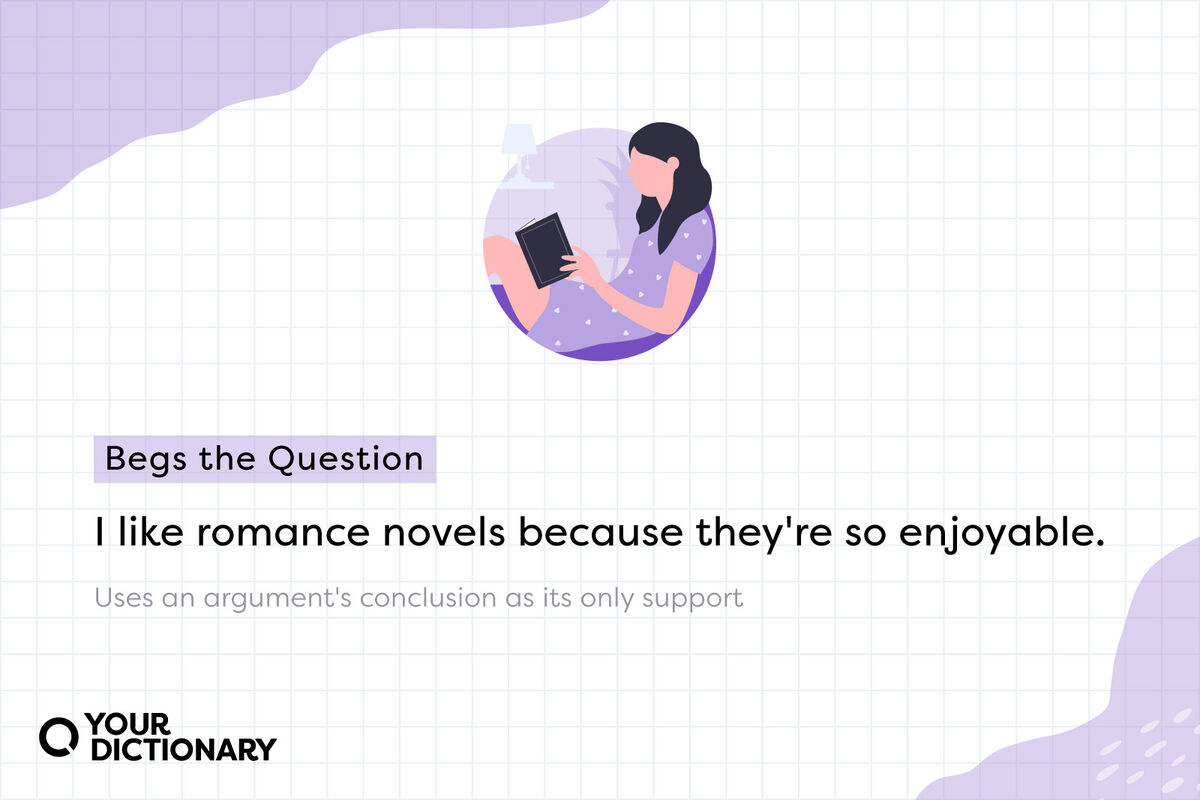
Many intelligent people (and people who like to sound intelligent) use the phrase "That begs the question" to mean that a situation raises a question. After all, questions need answers, so aren't they "begging" for an answer? Not in this case. Begging the question refers to making a faulty argument — and if you can recognize this fallacy, you're less likely to fall for it.
Begging the Question Is a Fallacy
"Begs the question" doesn't have anything to do with begging or even questioning. It's a rough translation of the phrase petitio principii ("assuming the original point"), which is the Latin adaptation of one of Aristotle's original fallacies. When someone begs the question, they are using an argument's conclusion as its only support.
Begging the question is an informal fallacy because it concerns faulty reasoning, not the argument's structure. Saying "X is true because it's true" creates an invalid argument without real support.
Examples of Begging the Question
An example of begging the question would be if someone said "Kelly is popular because everyone likes her," they're not actually explaining why she's popular. "Everyone likes her" is just another way of saying "popular." That's begging the question: basing your conclusion on an unproven assumption.
The most common type of begging the question is similar to circular reasoning, where an argument returns to its beginning without proving itself. For example:
- Stealing is wrong because it's immoral. (It's wrong because it's wrong?)
- Dogs are great to be around because they're wonderful companions. (Wonderful companions are generally great to be around.)
- I like romance novels because they're so enjoyable. (What makes them enjoyable?)
- This news story is important because all of the news stations are talking about it. (But why is it actually important?)
- Everyone should live in Florida because it's the best place to live. (What makes it the best place to live?)
These examples may seem obvious to you, but consider how tricky it could be to answer these arguments in real time. Many people get into trouble by assuming an argument to be true ("This politician is trustworthy because he says that I can trust him") and making life-changing decisions based on faulty conclusions.
How Can I Tell if I'm Using It Right?
If you've been using "begs the question" and "raises the question" interchangeably, this might be brand-new information. Do a quick check the next time you want to write "begs the question."
- If you're using a colon after it ("that begs the question:"), it's incorrect.
- If you're following "that begs the question" with a question, it's incorrect.
- If you're trying to say "raises the question," it's incorrect.
- If you're saying "that begs the question" after someone makes a faulty claim, it's correct.
But It's in the Dictionary!
A quick look at any major dictionary will determine that "begs the question" can mean "raises the question." And it's true — in everyday usage, you're far more likely to hear "begs the question" in this context. So what's the harm in using it this way?
Consider a scenario: You're making a passionate argument to an opponent who, unbeknownst to you, knows the fallacy meaning of "begs the question."
- You: And that's why we should have never entered that war — it was a bad idea.
- Opponent: That begs the question.
- You: Begs what question?
- Opponent: No, it just begs the question.
- You: I don't understand — what question does it beg?
- Opponent: You haven't proved your argument.
- You: But what question is it begging?
Embarrassing, right? Using proper word choice is always the best way to communicate clearly and avoid confusing exchanges like the one above. Your opponent was using "begs the question" correctly, and you were using it conversationally. Like all multiple-meaning words, there's no real harm in using "begs the question" in this way — as long as you understand both meanings (and don't mind stricter grammarians believing that you've said it wrong).
Use 'Raises the Question' Instead
But if you don't like the idea that others are judging your use of "begs the question," just replace it with "raises the question." It's just as valid and even more understandable. Best of all, "raises the question" leaves no room for misinterpretation — and addressing additional questions can help you avoid making a fallacious argument in the first place!
Avoid Falling For (and Using) Logical Fallacies
Many intelligent people have used “begs the question” when leading up to a discussion question. But even more have fallen for faulty arguments with bad reasoning and poor support. Equip yourself against fallacious arguments with these tips: